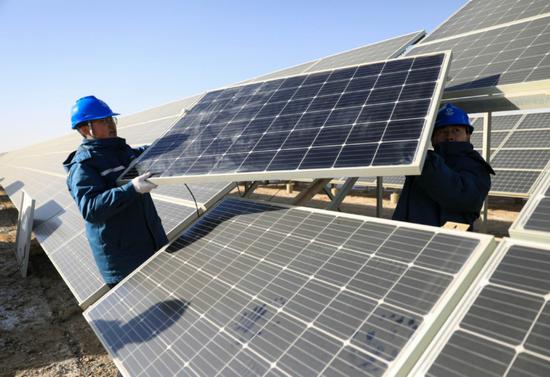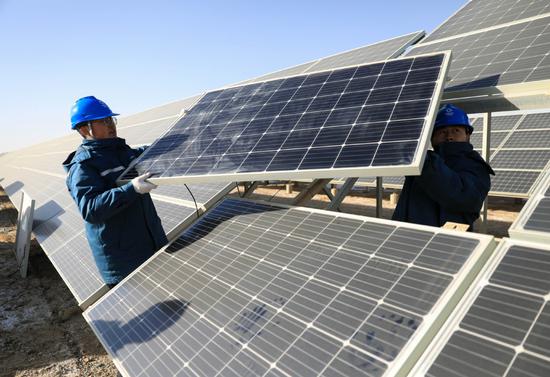Nation set to boost energy security
Report pegs self-sufficiency rate at 85% this year, 95% by 2060

Technicians install solar panels in Golmud, Qinghai province. (WANG LEI/CHINA NEWS SERVICE)
China is set to further enhance its energy self-sufficiency and expand its renewable energy dominance in the coming years, according to a report released during the International Energy Executive Forum 2024 held in Beijing on Wednesday.
China's energy self-sufficiency rate has climbed to an impressive 85 percent, or 5 billion metric tons of standard coal equivalent, in 2024, a five percentage point increase compared to a decade ago, according to the report released by the China National Petroleum Corp Economics and Technology Research Institute.
This is expected to further rise to 6 billion tons of standard coal equivalent, climbing to 95 percent by 2060, driven by accelerated innovation in exploration and the scaling up of renewable energy systems, it said.
China has made significant strides in solidifying its global leadership in wind and solar power, with a focus on scaling up the development of renewable energy. The integration of traditional and new energy sources has further enhanced the resilience and flexibility of the country's energy system, said Wu Mouyuan, vice-president of the institute.
According to Wu, oil and natural gas will continue to play a pivotal role in balancing energy security with China's transition to carbon neutrality, despite the advances of renewable energy sources, and these resources are expected to provide stability as the country works toward its long-term energy transformation goals.
Oil and gas are anticipated to remain integral to the energy mix in the medium to long term, minimizing disruptions during the energy transition. Stable investments and reliable projections are vital for sustaining robust supply levels and safeguarding global energy security, he said.
Wu noted that technological advancements, including innovations in ultra-deep oil and gas exploration and deep-sea resource development, are crucial to ensuring China's energy supply.
In March 2024, China achieved a milestone by drilling its first ultra-deep oil well exceeding 10,000 meters in vertical depth. This well not only set a record as the deepest in Asia, but also established a global benchmark for the shortest time required to drill a well of such depth, according to its operator China National Petroleum Corp.
In the oil drilling sector, wells with depths ranging from 4,500 to 6,000 meters are categorized as deep wells, those between 6,000 and 9,000 meters are classified as super-deep wells, and wells exceeding 9,000 meters are designated as ultra-deep wells.
The institute expects natural gas output to rise from 250 billion cubic meters currently to over 310 billion cubic meters by 2035, with further growth projected through 2060.
China has been tapping into unconventional resources to expand its energy supply, with significant advancements in shale gas exploration and coal-bed methane extraction currently reshaping the country's resource landscape, it said.
The combination of domestic natural gas development and the adoption of new technologies like coal gasification ensures that gas will remain a cornerstone of China's energy system, said Wu.
The untapped reserves, such as low-maturity shale oil and underground coal gasification, could unleash vast new potential in the coming decades, he said.
Li Guoxin, deputy chief geologist of PetroChina, believes unconventional resources will see exponential growth with continued technological breakthroughs, which will not only enhance self-sufficiency but also provide a buffer against external market uncertainties.
Wu added that the rapid development of artificial intelligence, advanced manufacturing, new energy and new materials all require significant energy resources to support their development.

